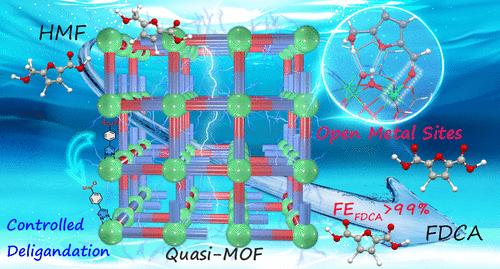基于配体工程的准金属-有机骨架的合理设计及高效生物质升级
IF 14.4
1区 化学
Q1 CHEMISTRY, MULTIDISCIPLINARY
引用次数: 0
摘要
5-羟甲基糠醛(HMF)电氧化制2,5-呋喃二羧酸(FDCA)是一种可降解生物塑料单体,是一种很有前景的生物质升级策略,但需要设计出高效、选择性高的催化剂。利用金属有机骨架(mof)的开放金属位,准mof是一种可行的催化剂,但设计性差和结构不可预测阻碍了其发展。本文采用控制配体工程的方法,合理设计并合成了镍基准mof。与原始mof中完全占据的金属簇相比,准mof中可接近的Ni位点可以有效地将HMF转化为FDCA,具有显著的法拉第效率(99.2%)和FDCA选择性(98.3%)。原位表征和机理分析表明,准mof中部分配体断开所产生的开放Ni位点对高价活性物质的形成和HMF的氧化至关重要。此外,作为集成电解系统的阳极,这种准mof不仅可以降低电池的产氢电压,还可以生产出高纯度、产率高的FDCA,为同时生产高附加值化学品和可持续氢气提供了新的机会。本文章由计算机程序翻译,如有差异,请以英文原文为准。

Rational Design of a Quasi-Metal–Organic Framework by Ligand Engineering for Efficient Biomass Upgrading
The electrooxidation of 5-hydroxymethylfurfural (HMF) to 2,5-furandicarboxylic acid (FDCA), a monomer for degradable bioplastic, is a promising strategy for biomass upgrade and yet requires well-designed catalysts with high efficiency and selectivity. Taking advantage of the open metal sites of metal–organic frameworks (MOFs), quasi-MOFs represent viable catalysts, but the poor designability and unpredictable structures hinder their development. In this work, a Ni-based quasi-MOF was rationally designed and synthesized by controlled ligand engineering. Compared to the fully occupied metal clusters in the pristine MOFs, the accessible Ni sites in quasi-MOFs can efficiently convert HMF to FDCA with remarkable Faradaic efficiency (99.2%) and FDCA selectivity (98.3%). In situ characterizations and mechanistic analysis revealed that the open Ni sites created by partial ligand disconnection in quasi-MOFs are critical to the formation of high-valent active species and HMF oxidation. Moreover, serving as the anode in an integrated electrolysis system, such a quasi-MOF can not only reduce the cell voltage for hydrogen generation but also produce high-purity FDCA with good yield, offering a new opportunity for the simultaneous production of high value-added chemicals and sustainable hydrogen.
求助全文
通过发布文献求助,成功后即可免费获取论文全文。
去求助
来源期刊
CiteScore
24.40
自引率
6.00%
发文量
2398
审稿时长
1.6 months
期刊介绍:
The flagship journal of the American Chemical Society, known as the Journal of the American Chemical Society (JACS), has been a prestigious publication since its establishment in 1879. It holds a preeminent position in the field of chemistry and related interdisciplinary sciences. JACS is committed to disseminating cutting-edge research papers, covering a wide range of topics, and encompasses approximately 19,000 pages of Articles, Communications, and Perspectives annually. With a weekly publication frequency, JACS plays a vital role in advancing the field of chemistry by providing essential research.

 求助内容:
求助内容: 应助结果提醒方式:
应助结果提醒方式:


